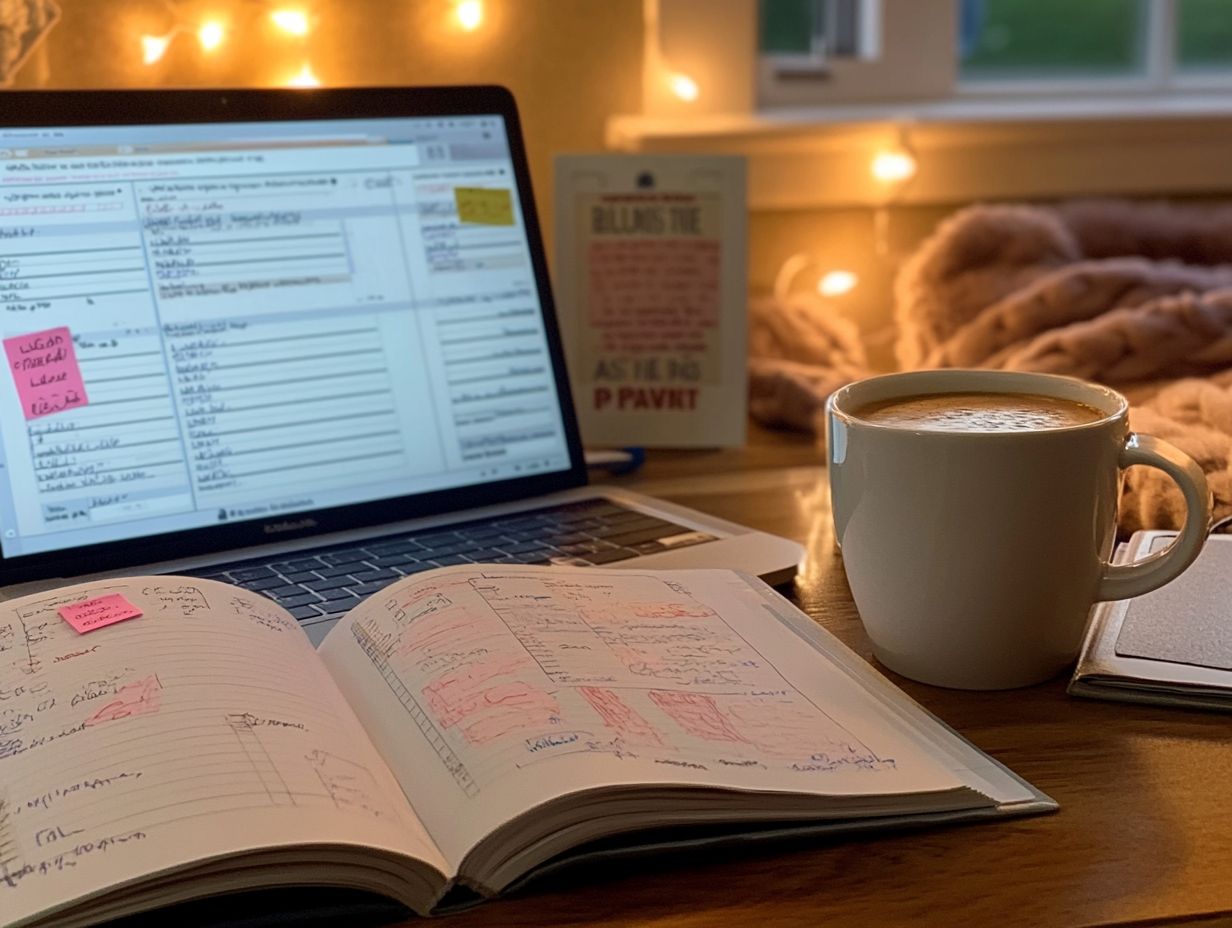preparing for the sat: best study practices
The SAT is important in the college admissions landscape, underscoring the need for students to engage in thorough preparation.
This guide will equip you with the steps to craft a personalized study plan, evaluate your current skills, and establish attainable goals.
You ll uncover effective study techniques, ranging from practice tests to strategic note-taking methods, customized for each section of the exam.
You will also find strategies to manage test anxiety and maintain motivation throughout your preparation journey.
Ready to boost your SAT success? Let s dive in!
Contents
- Key Takeaways:
- Creating a Study Plan
- Effective Study Techniques
- Preparing for Specific Sections
- Staying Motivated and Managing Test Anxiety
- Frequently Asked Questions
- 1. What are the best study practices for preparing for the SAT?
- 2. Should I study for the SAT on my own or seek outside help?
- 3. How far in advance should I start studying for the SAT?
- 4. Is it necessary to take practice tests while studying for the SAT?
- 5. What should I do on the day before the SAT?
- 6. Are there any specific strategies I can use during the SAT to improve my score?
Key Takeaways:

- Assess your skills and set achievable goals to boost your SAT score.
- Use effective study techniques like practice tests and note-taking.
- Prepare specifically for math, reading, writing, and the essay with helpful resources.
What is the SAT and Why is it Important?
The SAT, or Scholastic Assessment Test, stands as an important standardized test widely utilized for college admissions across the United States. It is designed not just to check how ready you are for college but also to assist colleges in evaluating applicants.
This important exam is a key factor for admissions officers, impacting scholarship opportunities and providing a benchmark for academic performance in comparison to the Pre-SAT test for college readiness scores. By grasping the importance of the SAT, you can plan your studies effectively to achieve your desired SAT Target Score, which is instrumental in shaping your overall college admissions strategy.
Originating in the early 20th century, the SAT has undergone remarkable evolution, mirroring shifts in educational standards and testing methodologies. Its format has transformed over the decades, incorporating a writing section and emphasizing critical thinking skills, allowing for a more holistic evaluation of a student s capabilities.
For many, achieving high SAT scores can be a key that unlocks the door to merit-based scholarships, making financial aid more accessible. Excelling on the SAT not only bolsters individual college applications but also enhances your overall student profile, setting you apart in an increasingly competitive landscape where every point truly counts.
Creating a Study Plan
Creating a structured study plan is crucial for effective SAT preparation, and knowing the best time to start preparing for the SAT can help you tailor your approach according to your unique strengths and weaknesses.
A thoughtfully crafted study plan organizes the material you need to cover and ensures that you allocate your time efficiently for practice tests. This way, you can monitor your progress and adjust your strategies as necessary, maximizing your readiness for the exam.
Assessing Your Current Skills and Setting Goals
Assessing your current skills through practice test scores is essential for understanding your strengths and weaknesses in the subjects covered by the SAT. This understanding enables you to establish realistic and achievable goals for your preparation.
Beyond taking diagnostic tests, reviewing your results offers valuable insights into specific areas that may require additional focus. Recognizing where you excel can bolster your confidence, while identifying your weaknesses provides clarity on what to prioritize.
Setting measurable, attainable goals maintains your motivation and facilitates tracking your progress over time. By incorporating a variety of study techniques such as flashcards, practice questions, and group study sessions you’ll cultivate a more comprehensive mastery of the material.
With a well-organized plan, you can navigate your study efforts with greater effectiveness, ultimately leading to improved outcomes on test day.
Now, let s take the first step together toward your SAT success!
Choosing Study Materials and Resources

Selecting the right study materials and resources for the SAT is crucial for effective preparation. You have access to options like free SAT practice through platforms such as Khan Academy, the Official Digital SAT Prep, and the Bluebook app. Additionally, consider exploring tips for preparing for the SAT math section to enhance your study strategy. All of these offer tailored support for various academic courses.
These resources equip you with valuable practice questions, review materials, and strategic insights that align perfectly with the SAT’s structure and content.
In addition to these tools, include a variety of video tutorials, interactive quizzes, and detailed textbooks that cater to your unique learning style. Visual learners might excel with video explanations, while those who prefer the written word can immerse themselves in comprehensive guides filled with examples.
By combining free resources with personalized study aids, you enhance your understanding and retention. This ensures you can tackle both the quantitative and verbal sections with confidence. Incorporating diverse materials allows you to create a well-rounded study plan that addresses your individual needs, making your journey toward SAT success engaging and effective.
Effective Study Techniques
Using effective study techniques is key to mastering the SAT. Consider using practice exams for SAT preparation as these strategies will boost your retention and understanding of the test material.
Consistent practice tests and well-structured time management are key components in this process. By exploring various learning strategies, you will be able to identify the methods that resonate most with you, ensuring thorough preparation for test day.
Practice Tests and Timing Strategies
Utilizing practice tests strategically is vital for your SAT preparation. These tests allow you to familiarize yourself with the exam format while sharpening your time management skills both critical for achieving your target score.
By simulating actual test conditions, you can cultivate effective test-taking strategies that boost your confidence and enhance your performance on exam day. These practice sessions not only highlight areas needing improvement; they motivate you to adopt specific timing strategies that elevate your efficiency in tackling questions.
For example, mastering the art of allocating time per question can help reduce anxiety and improve accuracy, making a significant difference in your overall results. Incorporating various test-taking techniques, such as eliminating incorrect answers or prioritizing easier questions, leads to clearer thinking and a more strategic approach during the actual test.
Ultimately, embracing these practices sets the stage for better preparedness, fostering not only knowledge but also the mental resilience you’ll need when exam day arrives. Start practicing now to boost your confidence and performance!
Note-taking and Memorization Methods
Adopting effective note-taking and memorization techniques can significantly elevate your learning strategies for the SAT. By using methods such as mind mapping, summarization, and spaced repetition a study method that helps you remember information by reviewing it at increasing intervals you can enhance your study efficiency and ensure a comprehensive understanding of the material covered in your courses.
These techniques not only make learning more engaging but also cater to diverse learning styles whether you re more visual, auditory, or kinesthetic. Mind mapping allows you to visually organize information, making it easier to see connections between concepts, while summarization encourages you to distill information to its core, promoting deeper comprehension and quicker recall.
By implementing these strategies, you not only master SAT content but also cultivate lifelong learning habits that will serve you well beyond your test preparation. Get excited about exploring these strategies!
Preparing for Specific Sections

Preparing for specific sections of the SAT Math, Reading, Writing, and the optional Essay requires targeted strategies and a clear understanding of each section’s unique requirements. By focusing on the content and format of these areas, you can apply tailored test-taking techniques that enhance your performance. For more insights, check out understanding the SAT: key facts and tips to strengthen your grasp of essential academic concepts. Embracing this focused approach ensures you are fully equipped to tackle the exam with confidence.
Math, Reading, Writing, and Essay Tips
Each section of the SAT Math, Reading, Writing, and the Essay requires mastering distinct strategies and content, meaning you need tailored test-taking tips for optimal performance. By using focused preparation techniques and understanding how points are awarded in each section, you can boost your confidence and effectiveness across the test.
To excel in Math, grasp fundamental concepts. Practice problem-solving techniques and manage your time well. In Reading, employing active reading strategies like annotating passages and summarizing key points can significantly enhance your comprehension and speed.
In Writing, a strong command of grammar and style is critical. Familiarize yourself with common errors and practice editing techniques. For the Essay, developing a clear structure and articulating your arguments persuasively can elevate your score, as evaluators seek coherence and analytical depth in your response.
Staying Motivated and Managing Test Anxiety
Staying motivated and managing test anxiety are essential components of your SAT preparation, especially when pressure and uncertainty can impact your performance. By integrating self-care routines and mindset techniques into your study regimen, you can develop a positive attitude and resilience. This approach will help you maintain focus and confidence as test day approaches.
Self-Care and Mindset Techniques
Implementing self-care and mindset techniques helps enhance your SAT preparation experience, alleviating test anxiety while boosting your motivation. Engaging in activities that promote mental well-being like exercise, meditation, and positive affirmations nurtures a healthier mindset, paving the way for improved focus and performance on exam day.
Regular physical activity not only energizes your body but also releases endorphins, naturally elevating your mood. Mindfulness through meditation creates a clearer mental space, equipping you to tackle complex problems with greater clarity. Establishing a consistent routine of positive affirmations builds self-confidence and resilience, reminding you of your capabilities.
When you incorporate these self-care techniques into your daily life, you support your overall mental health while creating a balanced approach to your study schedule. Prioritizing mental health is crucial not just for reducing stress but also for academic success, ensuring you’re well-prepared and centered when it matters most.
Frequently Asked Questions

1. What are the best study practices for preparing for the SAT?
The best study practices for preparing for the SAT: the ultimate guide include creating a study schedule, reviewing content, practicing with official SAT materials, taking timed practice tests, and seeking additional resources or support from tutors or prep courses.
2. Should I study for the SAT on my own or seek outside help?
It’s always recommended to seek outside help, such as a tutor or prep course. They can provide valuable insights, strategies, and personalized support to help you achieve your best score.
3. How far in advance should I start studying for the SAT?
It’s best to start studying for the SAT 3-4 months in advance, but adjust based on your needs and current understanding of the material.
4. Is it necessary to take practice tests while studying for the SAT?
Yes, taking practice tests is essential for preparing for the SAT. They help you understand the test format. They also allow you to identify your strengths and weaknesses and track your progress.
5. What should I do on the day before the SAT?
The day before the SAT, take a deep breath and relax! Avoid cramming to feel your best.
6. Are there any specific strategies I can use during the SAT to improve my score?
Yes, there are various strategies you can use during the SAT to boost your score. Read questions carefully, guess strategically, manage your time, and eliminate answers you know are wrong. Practice these strategies before the test to feel more confident.





